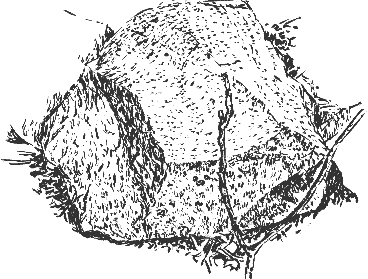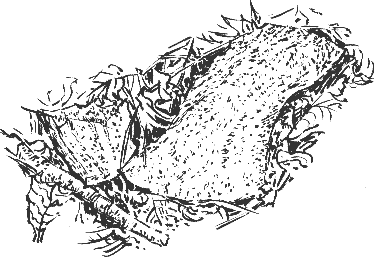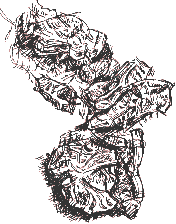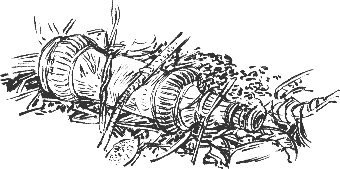
|
ShardsValentine's Day, 14th February 2003, West Yorkshire |
![]()
![]()
![]()
![]() Rocks |
History |
Workshop |
Links |
Home Page
Rocks |
History |
Workshop |
Links |
Home Page
![]()
 This
chunk of sandstone, one in a ring around the ashes (see 24th
January) of a bonfire has been reddened at the side nearest the
heat. You can see from my sketch that although the lower part of the rock
is weathered, the top facets are freshly exposed; heat has shattered it.
This
chunk of sandstone, one in a ring around the ashes (see 24th
January) of a bonfire has been reddened at the side nearest the
heat. You can see from my sketch that although the lower part of the rock
is weathered, the top facets are freshly exposed; heat has shattered it.
 Two
small fragments lie just to the right of the ring of stones while another
two larger shards lie 11 feet away on the grass. Were they flung there
when the stone exploded?
Two
small fragments lie just to the right of the ring of stones while another
two larger shards lie 11 feet away on the grass. Were they flung there
when the stone exploded?
I guess that it was moisture turning into steam in the pores between the sand grains the rock, or in planes of weakness running across the rock, that shattered it. There's a slight speckling on the freshly exposed facets that makes me wonder if micro-organisms such as single-celled algae or bacteria might have already colonised a microscopic fracture line within the rock.
Like the block they were chipped off from these fragments are reddened, where the heat has oxidised iron salts in the matrix of the rock.
 Sea-green
Shards
Sea-green
Shards
In the debris by the campfire there's another sign of the intense heat; partially re-melted bottle-green glass. It sparkles in the sunlight which picks out bubbly, wavy facets in the shards, giving an impression of translucent bubbling sea water. The misshapen fragments have an ashy frosting on their streaked upper surfaces resembling birch bark.
 The
Greenhouse Effect
The
Greenhouse Effect
Debris from the chestnut and the excavations of rabbits are rapidly turning this discarded bottle into a piece of archaeology. In this setting you might take it for a Victorian patent medicine bottle; its fluted bulges give the look of a Russian church, or a Turkish turban but the modern label on the neck, 'CAMPERY', suggests that it's some kind of fizzy alcoholic drink (I can't find it on the internet, but Champéry is a Swiss ski resort).
The bottle now acts as a mini-greenhouse for a film of algae that has
grown on the inside surface of the glass.![]()
![]() Next page | Previous
page | This
day two years ago | This month |
Nature Diary |
Home
Page
Next page | Previous
page | This
day two years ago | This month |
Nature Diary |
Home
Page
![]()